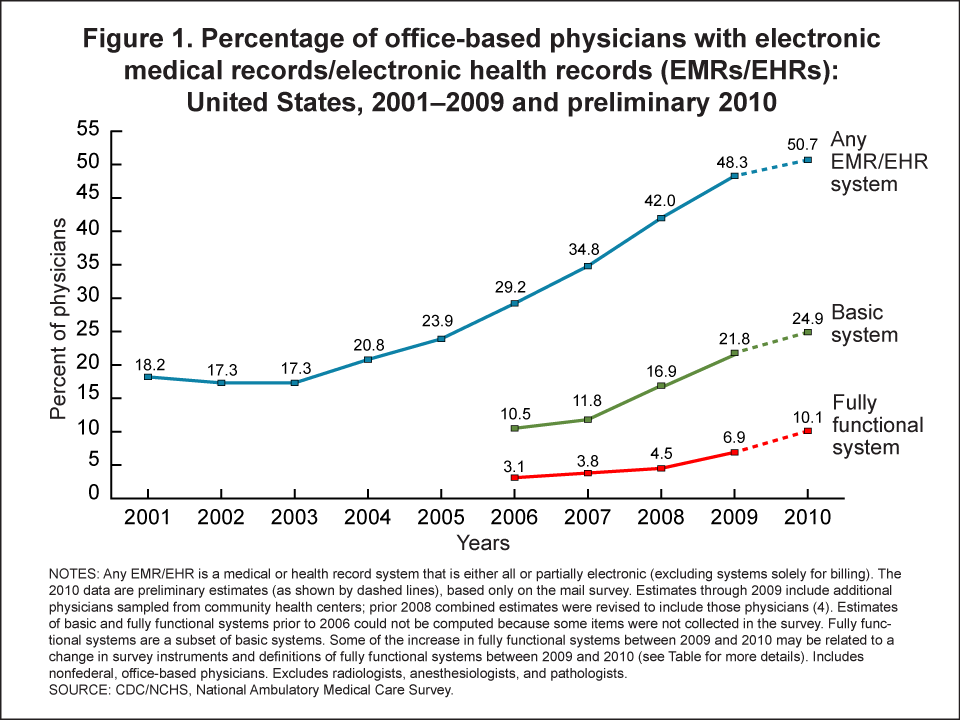IT in medicine: the way of the USA

Today IT has penetrated into our lives everywhere. However, the field of medicine remains virtually untouched in the CIS countries. Doctors still make entries in paper cards, write out paper sick-lists, and use computers only to register patients in private clinics. It is not surprising, but the introduction of IT in medicine is rather slow in the west. There are reasons for this, and this state of affairs seems to have completely tired of the US authorities, and they decided to take matters into their own hands.
On Habré already was an article about IT in medicine . But it seemed to me that it was written by the PR manager of the company. In the end, it turned out that "how good it is there and how bad it is here." I will try to describe everything from a pragmatic point of view.
')
We do not have a well-established name for medical systems, in English they are called EHR ( Electronic health record ). In the states, as of 2010, a little more than half of doctors use at least some EHR. At the same time, only about 10% of physicians use full-featured systems that completely eliminate paper from work.

It would seem that the advantages of EHR over paperwork are obvious - a quick search of all patient data, a reduction in doctor’s errors due to system prompts, the ability to get quick access to rare medical cases and many others. Why then so slowly and painfully IT technologies are being introduced into medicine in a country that has always been ahead of us in information technologies and which has all the financial capabilities (and paid medicine as well)? After all, 10 years ago, information technologies were at a sufficient level to introduce them into medicine. In reality, all these benefits can be obtained only in the case of mass use of EHR by doctors and provided that data is easily exchanged between different EHR systems. After all, medicine is a whole network in which doctors, pharmacists, laboratory technicians, insurance companies interact. They all use different systems, and they all need access to patient data.
There is nothing surprising that doctors, people far from IT, are the main opponents of using EHR. They need to spend money to buy the system, they need to spend time learning to work with it, they need to enter the current patient data into the system. Often, writing a diagnosis and prescription on a piece of paper is much faster than finding the name of the disease and the necessary drugs in the database. All this slows down the work of the doctor, which in the conditions of paid medicine leads to a decrease in his profit. There are still discussions in the English-language Internet about whether the introduction of EHR is capable of improving the quality of medicine in general.
In the meantime, standards have been developed in the US that must comply with the EHR, as well as an EHR certification program. The government has created a reward program for doctors . The incentives are very pleasant - the state pays $ 44,000 to each doctor who will consciously use a certified EHR. With these measures, they immediately solved the problem of interaction between different systems (file import and export standards) and the problem of mass system implementation. Moreover, this amount will be paid only to those who will start using EHR in 2011-2012. Who later - the amount will be less. Well, for those who do not switch to EHR until 2015, fines will be imposed.
The ease of use of the system by doctors, each developer company decides in its own way. Our company has held discussions with existing customers (and the company has been on the medical software market for more than 20 years). It turned out that doctors want an interface that would require them to use the keyboard only in rare cases. They want to make the most of records, using only the mouse or the stylus. As a result, the process of making records about the patient’s condition became similar to a questionnaire. Each doctor has his own starting form, with the operations he uses most often. Because of the need to create a lot of simple forms, the form designer was made. But that's another topic.
Source: https://habr.com/ru/post/116753/
All Articles